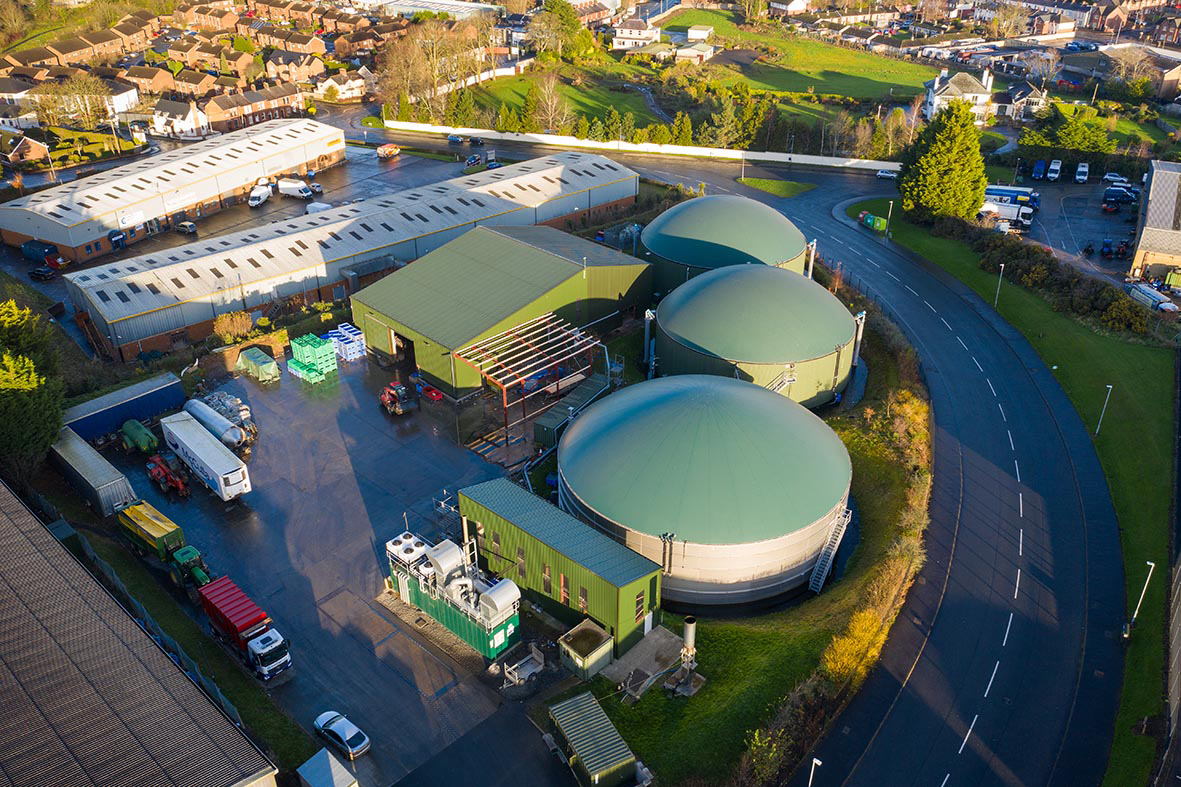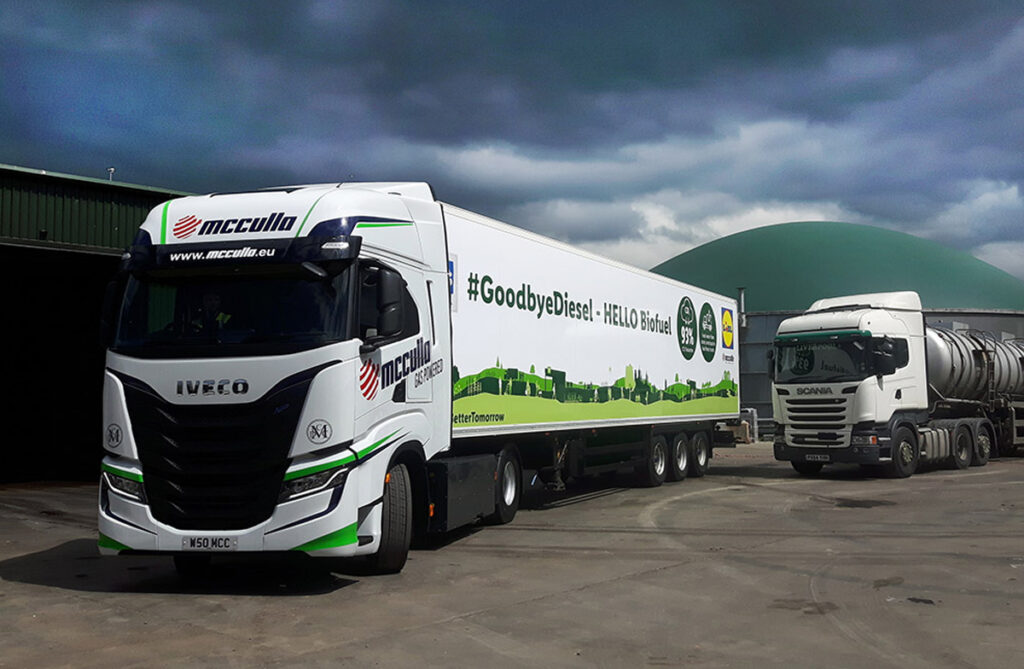McCulla (Ireland) Ltd is one of Northern Ireland‘s largest food transport companies with 235 employees and a cold storage facility measuring almost 8,500 square metres. This month the logistics company is going live with biomethane production, powering ten Compressed Natural Gas (CNG) lorries.
Each year 17,500 tons of food waste, collected from 41 Lidl supermarket stores, will be converted into natural gas at McCulla’s expanded biogas plant in Lisburn (near Belfast). 450 cubic metres of biogas will be processed into biomethane every single hour.
The journey towards a McCulla biogas plant began in 2017 with expertise from WELTEC BIOPOWER – a global specialist in the construction and operation of biogas and biomethane plants. The original plan was to utilise residual materials from a McCulla owned agricultural business to generate renewable electricity for use in the refrigerated warehouse at the main logistics depot and it worked out well.
“By digesting slurry, agricultural residues and grass silage from our farm, we were able to produce green energy ourselves with a 500kW CHP plant and use it on our company premises. Ultimately, this has significantly improved our carbon footprint.“ explains Ashley McCulla, Chairman of McCulla (Ireland) Ltd. “Our ultimate goal was always to use energy produced by the AD plant to power our logistics fleet as well.”
All McCulla’s Lidl food deliveries will be made with renewable gas
The expansion and upgrade to biogas, HGV fuel production and becoming Ireland’s greenest fleet was a logical next step following the positive AD experience and the firm’s food industry network. McCulla has been supplying Lidl Northern Ireland‘s supermarkets for five years. The new CNG Iveco S-WAY 4×2 lorries will refuel at the McCulla biomethane refilling point and all Lidl food deliveries will be made with renewable gas under the motto ‘Goodbye Diesel – Hello Biofuel’.
“We’re thrilled to now be the first supermarket retailer to successfully integrate the first waste-to-energy sustainable transport model.” says Conor Boyle, Regional Director of Lidl Northern Ireland, adding “McCulla’s fleet covers more than 2,300 road miles per day, ensuring the safe and timely delivery of fresh and chilled foods to more than 300,000 weekly customers across our regional store network. The introduction of this new ‘green fleet’ operating on fully renewable biomethane as its primary fuel source will save more than 93% in carbon emissions due per bio-methane truck.”

Lidl food waste is automatically unpacked and pasteurised at the biomethane plant
To ensure successful performance long-term, WELTEC BIOPOWER relied on its established components and technologies. Four pits are available for the pre-storage of the substrates. The subsequent anaerobic digestion takes place in two digesters made of stainless steel with a diameter of 23.03m, a height of 6.30m and a capacity of 2,625m³ each. The digestate is stored in a 3,432m³ stainless steel gas-tight storage tank. In order to fully exploit the energy potential of the food waste, WELTEC has equipped the 80m³ dosing feeder in combination with the MULTIMix pre-feed system. In it, food leftovers are shredded and homogenised. In addition, the Lidl waste is automatically unpacked and pasteurised at the biomethane plant.
More than doubling output from the original 500kWe plant with food waste
In the course of the extension, WELTEC BIOPOWER upgraded the in-house developed LoMOS PLC-based control system. “We also retro-fitted the extra gas lines, installed a second emergency flare and ensured that all components were connected smoothly with no downstream consequences on the original plant, which since commissioning has shown some of the top performance figures in the industry”, WELTEC Sales Manager Dr. Kevin Monson explains. “Last but not least, our Biology Department guaranteed a trouble-free substrate changeover, more than doubling output from the original 500kWe plant without further investment in digestion space, by switching from grass silage and slurry to food waste“ adds Dr. Monson.
The biogas upgrading system comes from Pentair Haffmans. The tried and tested module separates carbon dioxide and other components of the biogas from methane using membrane technology. This creates biomethane that is similar in its properties to natural gas, but is significantly more climate-friendly. Despite processing 450 standard m³ of biogas per hour, the 500-kilowatt CHP continues to run, McCulla can use the electricity and heat for its headquarters and the cold storage facility.
With the tried and tested technology package and its extensive biomethane expertise, the German biogas specialist WELTEC and its partner Pentair Haffmans is making a significant contribution to McCulla being able to lay claim to being one of the greenest transport companies in Ireland. McCulla has already announced that the sustainable transport model will be applied to the entire HGV fleet over the next five years.



